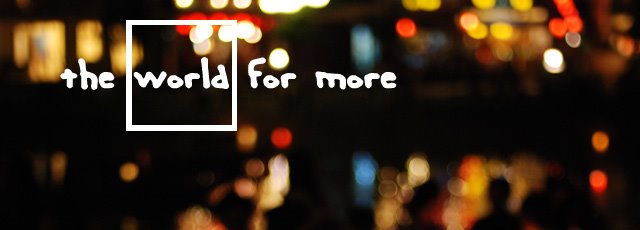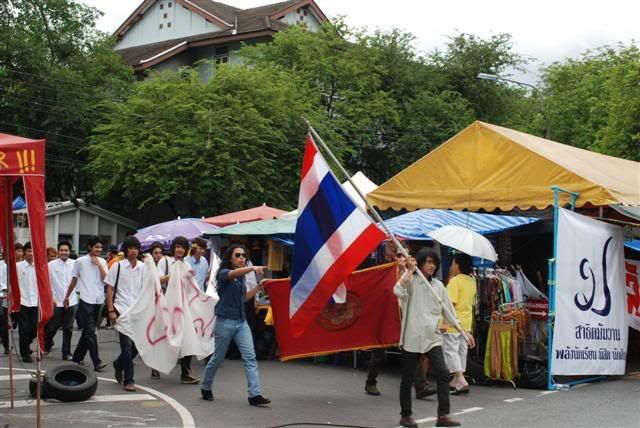“Social responsibilities and obligations are very necessary because people must obey what society puts forth in order to benefit its residents; everyone must follow the laws for society to prosper”
- Undergraduate Student at University of Social Sciences and Humanities HCMC, 2007.
A woman from Thanh Hoá and her four year old son sell chewing gum and tissue paper to Western tourists in the backpacker area of Hồ Chí Minh City outside a well-known drinking establishment. Occasionally the boy dances on the tables, and tugs on sleeves to draw a smiling eye in hopes of making a sale. Western tourists, in all their worldliness, frequently take this opportunity to photograph the entertaining little yellow monkey. How great it must be to visit such a large zoo. With tears forming around the edges of her eyes, she explains how her son is a quick learner. Coming from a poor sea-side community of subsistence farmers in the north often devastated by natural disaster, she and her young son migrated to this urban center over two years ago after the government did not distribute an adequate level of disaster relief aid to help them rebuild their lives. She has left behind a husband and two high-school aged children in order to seek opportunities for additional income to support her family. Each month she sends her earnings back home. Her only ambition in life is to see all of her children complete their schooling and use their hard-earned educations to open doors which she has never had access to. Dance little boy, these tourists love the real Việt Nam.
A group of elderly and middle-aged women from Long An position themselves on scraps of cardboard under the shade of trees and buildings on the street named after a national heroine, Võ Thị Sáu, who once said while under French imprisonment: “I am a patriotic person without offences—your military, which steals from my country and kills my people, are the ones who have committed offences.” These women are holding hand-written messages of protest on pieces of cardboard and tattered rice bags—their livelihoods are now virtually non-existent, their land has been taken from them in a system that feeds itself through corrupt means that in effect pushes the poor further out into the socioeconomic periphery. Upon approaching them, two of the women stand up with their signs to show their plight. A man dressed in light blue colored clothing, holding a walkie-talkie and likely a plain-clothes police officer or local gangster, tells the woman to put away the sign. They’re not taking any photographs, she protests. Let them read this, they say, and understand what is being done to us. A bulky man with closely shaved hair and a frown on his face crosses the street—it looks like it is time to leave. A steady stream of cars and motorbikes pass by. No one else stops. How ironic, what would the national heroine, who the street is named after, say?
On a street corner, five hours before the next sunrise, a group of fifteen or so police officers encircle a street vendor’s cart which has been securely chained to a commercial building. All the uniforms’ eyes are on the street vendor’s cart with their hands crossed behind their backs in a similar manner. The street vendor, who has sold coffee, tea, and other beverages in this very spot for the past fourteen years, has gone home for the night. From these earnings, she has been able to afford her children’s education—asleep now her children must be with their dreams, before waking for school the next morning. There is an air of excitement among the uniforms as the chain linked to the building’s iron barred windows is frantically and tragically being sawed away. With success, the uniforms gleefully push the street vendor’s cart and plastic chairs back to the local station. They walk as if they have achieved greatness. Perhaps if she can afford it, she can pay them to get her cart back. All this glorious development which enables society to achieve further socioeconomic gains—who is included in this model and what happens to those who don’t fit quite so well in the grand scheme? The night-time cigarette vendor, who has been told by the uniforms to move his cart down the street or face similar consequences, later asks how the poor working peoples such as him, would be able to afford to open businesses such as the twenty-four hour convenience store located down the street. He feels that were he to move his cart down the street, he would be infringing on other peoples’ livelihoods who are already working in that space. Without knowledge of the laws which dictate such action, he reluctantly obeys these uniforms who state that he is but a simple laborer who should not question their authority. The xe ôm drivers who work together on this street corner lament that something very similar is happening to them—they too are being told to move. What are the cigarette vendor and others like him to do when they do not possess the taxable capital in line with the development strategies of the socialist republic?

.jpg)


